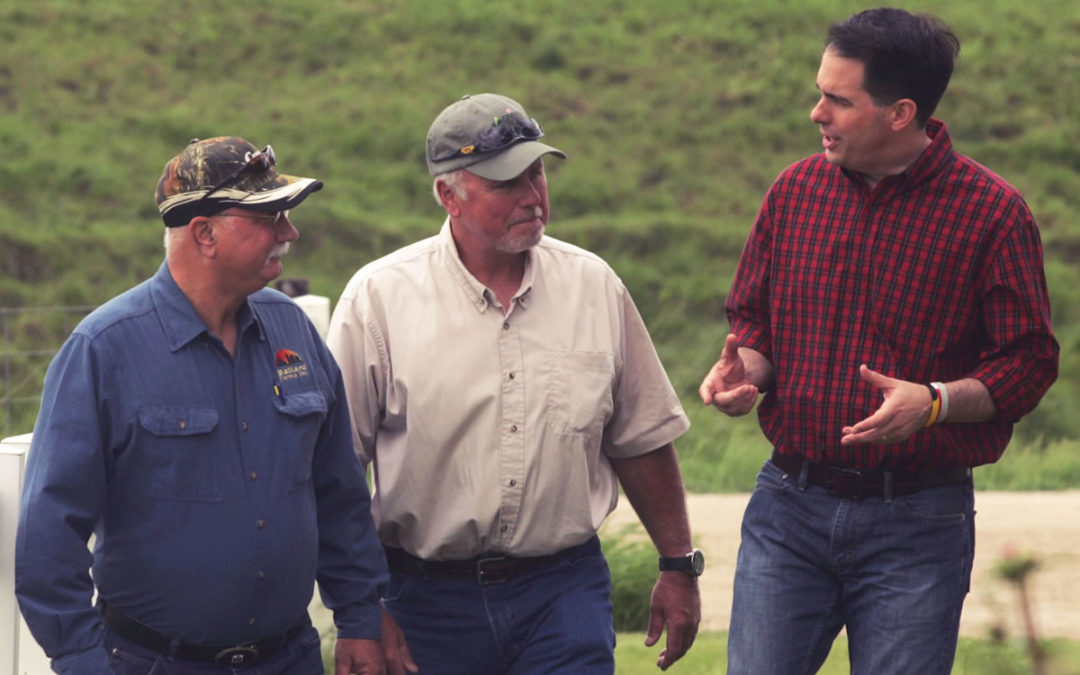My family moved to Iowa in 1970. My father was called to serve at a church in the small town of Plainfield. Most of the members of our church lived on farms. At the time our state representative was a farmer down the road. Today, he is the senior Senator from Iowa – Chuck Grassley.
Like most farmers we know, Senator Grassley works hard and does his homework. He is polite but firm. Decent, yet decisive. Humble and hard-driven. In other words, he’s a farmer.
Moving to Iowa was natural for us as my mother’s family grew up in agriculture. In fact, mom was raised on a farm that did not have indoor plumbing until she went to high school. My mom’s family still gets together for the holidays at the Grange Hall to swap gifts and catch up.
In 1977, we moved to another small town – Delavan, Wisconsin. There too, many of my classmates lived on farms or were involved with agriculture. Over the years, I watched as technology changed and improved on the farm.
For eight years as Governor, I attended each of the Farm Technology Days and marveled at the new equipment. Speaking at the World Dairy Expo became an annual event and I was impressed with the extensive science being used by today’s farmers. And over the years, I’ve made plenty of trips to farms big and small alike. Each time, I was amazed with the innovation and technology being used on today’s farms.
That’s why reports about comments made by former New York City Mayor Michael Bloomberg were so shocking to me. News outlets show that Mayor Bloomberg said the following about farming and manufacturing:
If you think about it, the agrarian society lasted 3,000 years, and we can teach processes. I can teach anybody – even people in this room, so no offense intended – to be a farmer. It’s a process. You dig a hole, you put a seed in, you put dirt on top, you add water, up comes corn. You can learn that. Then you had 300 years of the industrial society. You put the piece of metal on the lathe, you turn the crank in direction of the arrow and you can have a job. And we created a lot of jobs. At one point, 98% of the world worked in agriculture. Today it’s 2% of the United States.
Now comes the information economy and the information economy is fundamentally different because it’s built around replacing people with technology, and the skill sets that you have to learn are how to think and analyze. And that is a whole degree level different. You have to have a different skill set. You have to have a lot more gray matter. It’s not clear the teachers can teach, or the students can learn. And so, the challenge of society is to find jobs for these people.
He attacked my grandparents. My mother’s parents were farmers. My father’s father was a machinist. In this one statement, Mayor Bloomberg attacks both farmers and manufacturing workers with comments that are both blissfully ignorant as well as painfully condescending.
Farmers have to understand animal science, soil management, advanced math, meteorology, geography, botany, mechanics, hydrology, computer science, GPS mapping, finances, business administration, commodities, plant development, veterinary science, international trade and much, much more. Despite what a snobby New Yorker thinks, farmers are very smart in addition to being hard-working and decent people.
Sadly, many of the coastal elite believe their food just magically shows up in their refrigerator. The truth is thousands of brilliant people are working in agriculture all over this great country.
In 2020, a good litmus test for candidates running for office might be seeing if they’ve ever been to a farm. Not just seen one as they watch television or from the air as they fly over in their private jets. Now, more than ever, we need our leaders to celebrate and support our farmers.
For most, it is more than just a business. It is a way of life.
Thank God for farmers.



